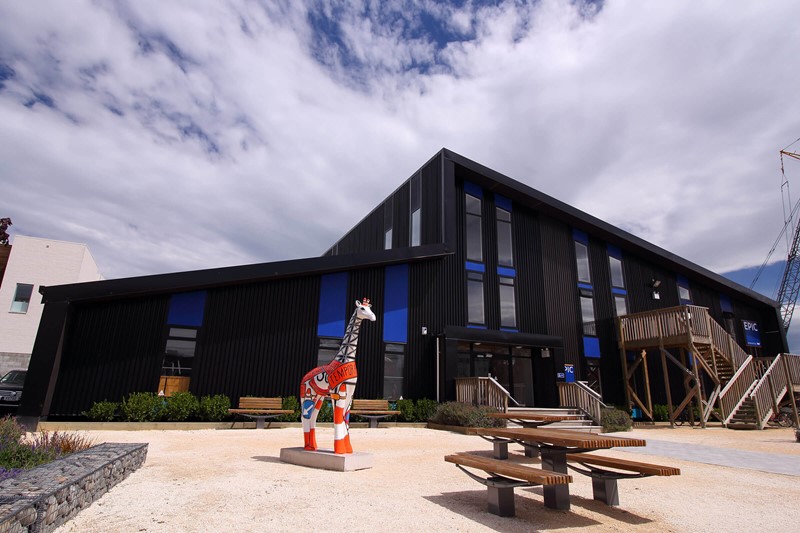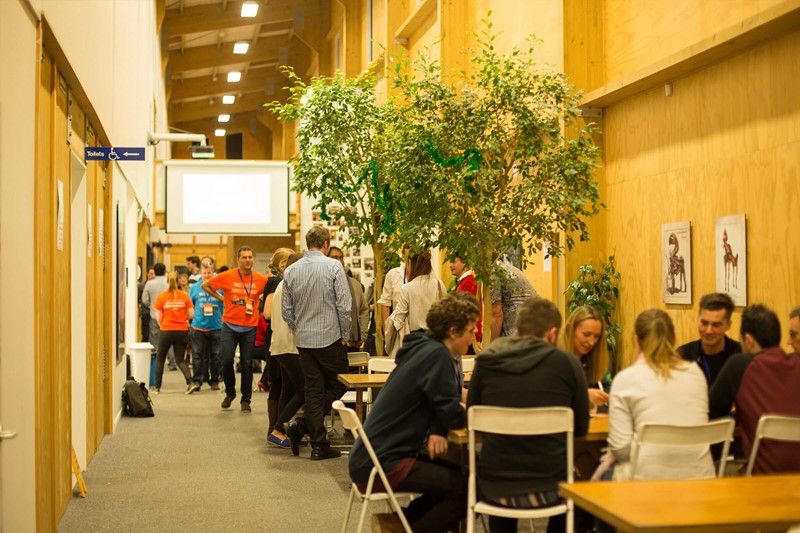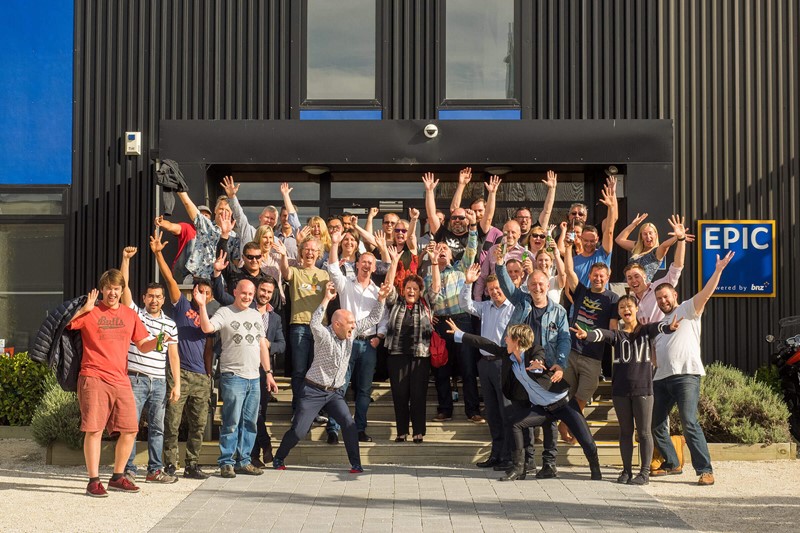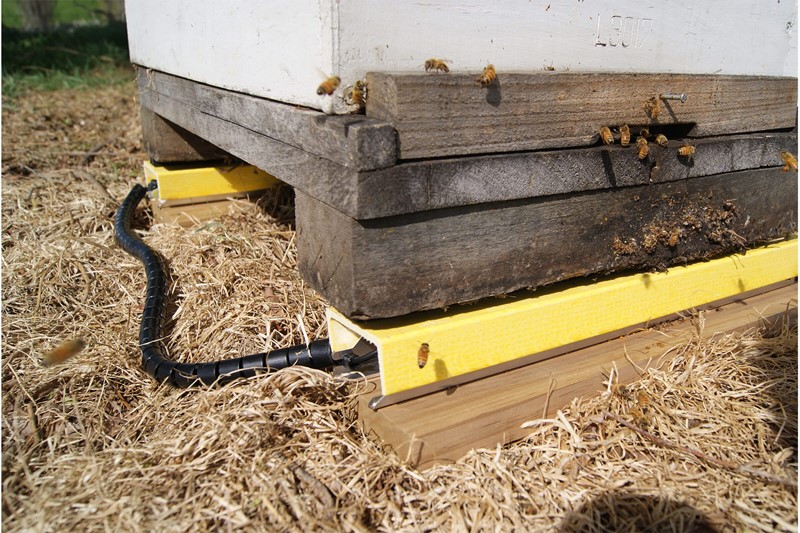Canterbury Innovators Post-Quake
After the earthquakes, Christchurch businesses were forced to take risks and work together to overcome shared challenges. That collaboration helped drive and fuel innovation in the city — something epitomised by the story of EPIC and its tenants.
Inside the high-ceilinged, wooden Enterprise Precinct and Innovation Campus (EPIC) building are hundreds of people working for companies that share a common connection: they’re in tech, going global, or tick both boxes.
From developers contributing updates to one of the world’s biggest games, Fortnite, to an agritech company delivering pioneering remote monitoring technology for beehives, the tenants at EPIC represent a hotbed of innovation.
“We’ve had loads of ambassadors from other countries through here, lots of people from Christchurch through here, and the normal comment is ‘wow, I never knew this was happening in Christchurch’,” says EPIC co-founder Wil McLellan.

EPIC was one of the first commercial developments in the central city after the February 2011 earthquake. It was driven by necessity to house ‘business nomads’ — the various post-startup companies which had their buildings wrecked in the earthquakes and needed new, safe, affordable premises to operate from.
Wil McLellan, EPIC Co-founder“The earthquakes encouraged people to work together. We were all facing similar challenges. We took bigger risks. We trusted each other a bit more than perhaps we normally would. We shared ideas and we supported each other.”
It was also a massive risk.
McLellan was involved with CerebralFix, a games development company, at the time of the earthquakes. They lost their offices and — eventually — managed to find new premises sharing with other companies. It turned out to be a short-term arrangement, but McLellan could see the benefits. Over drinks with fellow EPIC co-founder Colin Andersen, the pair discussed their shared need to find new offices, and the challenges of operating in Christchurch post-quake.
“After a few more drinks we said ‘why don’t we build a campus’,” McLellan says.
“That was ridiculous. We had no money, no experience, no land. There was a red zone around the city, we were working on rebuilding our houses, our businesses needed our help — there was a big list of reasons why we shouldn’t.”
“But then we said ‘well at least we know why we shouldn’t, so let’s do it and deal with those problems’.”
It was a massive undertaking, but the project came together quickly with support from a host of companies and organisations, including Google, which provided design advice (“They told us to treat people like plants: give them height and natural light,” McLellan says).
The building is designed to encourage collaboration and networking: there is a shared kitchen space, toilets, a lounge and meeting rooms; artwork from Weta Workshop adorns the walls, as well as a gigantic jigsaw puzzle showing a vista of New York City — staff from one of the former tenant companies put it together over the course of a year.

Asked what the culture of the building is, McLellan says it boils down to one word: collaboration. “And I can back that up, because I know I can walk into any one of these tenancies and ask for help and I’ll get it.”
There are about 16 tenants in EPIC, which opened in late 2012. On any given day, there could be 250 or more people in the building.
“People get energy from people,” McLellan says. “It’s not the building, it’s what’s happening in it. We have heard a lot of the companies here saying how much their staff like the energy, how much it’s helped them recruit, not just from New Zealand but globally.”
The benefits that were so immediately apparent after the earthquakes (the efficiencies of having shared amenities and being able to ask each other for advice and support) have continued, McLellan believes. And while innovation can flourish anywhere in the world, he has a theory on what the earthquakes prompted in Christchurch.
Wil McLellan, EPIC Co-founder“People get energy from people. It’s not the building, it’s what’s happening in it. We have heard a lot of the companies here saying how much their staff like the energy, how much it’s helped them recruit, not just from New Zealand but globally.”
“The earthquakes encouraged people to work together. We were all facing similar challenges. We took bigger risks. We trusted each other a bit more than perhaps we normally would. We shared ideas and we supported each other.”
Many of the tenant companies ChristchurchNZ spoke to emphasised the benefits of co-location.

Dru Hill, managing director of Treshna Enterprises, says it helps to raise the bar across the building and increases the pace of change.
Treshna sells GymMaster, software for the fitness industry which helps gyms manage their members, bookings and online presence. When the company first moved into EPIC it had eight staff — it now has 36. A large map hanging on the wall in its second story offices shows the locations of its servers around the world (the company has several thousand customers in more than 70 countries).

Another upstairs tenant, CerebralFix, which McLellan used to be involved with, develops games alongside multimedia giants like Disney. Downstairs, you can find companies using AI, working with virtual reality or developing and selling innovative software solutions — like Fraame Healthcare, a company which provides solutions to organisations like the Child Cancer Foundation, enabling them to better organise and maintain client information, including case notes.
Down the hall is Digital Confectioners, another gaming company, which this year had maps it created used in Fortnite, an online game played by hundreds of millions of people around the world.
Other companies, too, have a global reach.
Next January, agritech startup Hivemind plans to launch its third generation of remote hive monitoring equipment (which connects more sensors via the recently launched, low-cost Swarm satellite cluster) into the United States for almond pollination.
The company is a pioneer in remote beehive monitoring, meaning they use lots of sensors to collect and transmit data from beehives. That data provides insights that help reduce beekeeping costs, decreases hive disturbance, improves yield and helps beekeepers better care for their bees.

Hivemind was among the first tenants at EPIC. Company director Bryan Hoyt says the co-location aspect has been a big positive — Hivemind has been able to draw on the experience of other companies, including for a recent funding drive.
He believes the earthquakes brought out a “kia kaha mindset” in Christchurch, and since then the innovation culture in the city has only grown.
Startups began taking off, Hoyt says, as people began to ask: “nothing will ever be the same again, how can we turn that fact into an opportunity to change our city for the better?”


